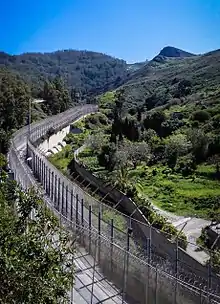Morocco–Spain relations
In recent times, Morocco–Spain relations have been friendly though intermittently discordant.[1]
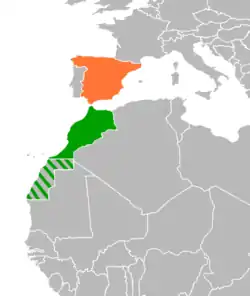 | |
Morocco |
Spain |
|---|---|
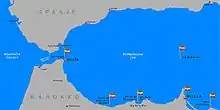
Country comparison
| Coat of Arms | 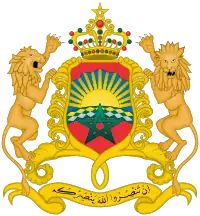 |
.svg.png.webp) |
| Flag | 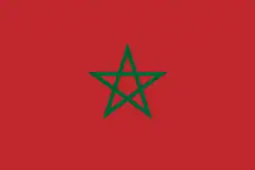 |
 |
| Population | 36,471,769 | 47,007,367 |
| Area | 710,850 km2 (274,460 sq mi) | 505,990 km2 (195,360 sq mi) |
| Population Density | 73/km2 (190/sq mi) | 92/km2 (240/sq mi) |
| Time zones | 1 | 2 |
| Capital | Rabat | Madrid |
| Largest City | Casablanca – 3,359,818 | Madrid – 3,141,991 |
| Religion | Islam (official) - 99% other religions - 1% |
Roman Catholicism - 61% Irreligious - 35% / other religions - 3% |
| Government | Unitary parliamentary constitutional monarchy | Unitary parliamentary constitutional monarchy |
| First Head of State | Al-Rashid of Morocco | Charles I of Spain |
| First Head of Government | Mbarek Bekkay | Francisco Martínez de la Rosa |
| Head of State | Monarch: Mohammed VI of Morocco | Monarch: Philip VI of Spain |
| Head of Government | Prime Minister: Saadeddine Othmani | Prime Minister: Pedro Sánchez |
| Legislature | Parliament | General Courts |
| Upper house | House of Councillors President: Hakim Benchamach |
Senate President: Pilar Llop |
| Lower house | House of Representatives President: Habib El Malki |
Congress of Deputies President: Meritxell Batet Lamaña |
| Official language(s) | Berber, Arabic | Spanish, Catalan, Basque, Galician and others. |
| GDP (nominal) | US$109.824 billion ($3,151 per capita) | $1.313 trillion ($28,359 per capita) |
History
Spain holds sovereignty over three territorial exclaves on Africa's Mediterranean coast (Ceuta, Peñón de Vélez de la Gomera and Melilla) as well as some smaller islands. All except Ceuta and Melilla are collectively referred to as the plazas de soberanía, and all territories are claimed by Morocco.
The relations deteriorated following the ascension to the Moroccan throne of Mohammed VI in 1999. Particularly the failure to reach a deal for fisheries between the European Union and Morocco in 2001 uneased the already complicated relations between José María Aznar and Mohammed VI.[2]
In October 2001, Morocco recalled its ambassador from Madrid after pro-Saharan groups in Spain conducted a mock referendum on the fate of the region.
On 6 July 2002 Spanish military operations in the Alhucemas Islands were perceived to be a aggression by Morocco.[2]
On 11 July 2002 Perejil Island crisis erupted; members of the Royal Moroccan Navy occupied the uninhabited Perejil Island off the North-African coast; 6 days later Spain launched the "Operation Romeo-Sierra" and 28 members of the Special Operations Groups of the Spanish Army took control of the islet evicting the 6 Moroccan cadets then present in the islet, who offered no resistance.[3] Diplomatic ties were not restored until January 2003. That July, Morocco complained that Spain lacked neutrality on the Sahara issue when it chaired the United Nations Security Council and, in October, Spain suspended arms sales to Morocco due to the Perejil crisis. Spanish Prime Minister Jose Luis Rodriguez Zapatero visited Morocco in April 2004, and King Juan Carlos I visited in January 2005; on both occasions, joint statements called for a negotiated settlement to the Sahara issue—the Moroccan position. However, visits to Ceuta and Melilla by the Spanish prime minister in January 2006 and monarchs in November 2007 again set back relations. The two neighbours also have an unresolved dispute concerning territorial waters between Morocco and the Spanish Canary Islands in the Atlantic Ocean. Morocco's "super port" near Tangier will pose competition that concerns Spanish ports. It is expected to achieve full capacity in 2014.[1]
Territorial disputes, despite their drama, are subordinate to the continuing and productive economic cooperation between both countries, there is also shared interests in counterterrorism, counternarcotics, and efforts to stem illegal immigration. Morocco notably assisted Spanish authorities in the investigation of the 2004 bombings in Madrid and this relationship continues. Moroccan soldiers have served under Spanish command in the United Nations Stabilization Mission in Haiti and Moroccan gendarmes have joined Spanish patrols to combat illegal immigration in the Strait of Gibraltar.[1]
On 31 July-1 August 2018 Morocco indefinitely closed the Beni Ansar Customs near Melilla.[4]
Following the breakdown of the ceasefire between the Polisario Front and Morocco, which led to armed clashes between both sides in November 2020, Spanish Second Deputy Prime Minister Pablo Iglesias tweeted the UN resolution of 1995 for the Western Sahara: "... It reiterates its commitment to hold, without further delay, a free, fair and impartial referendum for the self-determination of the people of Western Sahara ...". Unidas Podemos, minor member of the coalition government, requested the Prime Minister the same referendum to be held, [5] clashing with the official position of the government expressed by Spanish Minister of Foreign Affairs Arancha González Laya.[6]
On 21st December 2020, following the affirmations of the Moroccan Prime Minister, Saadeddine Othmani, stating that Ceuta and Melilla "are as Moroccan as the [Western] Sahara" after Trump's administration recognition of sovereignty over that territory, Spain's Secretary of State for Foreign Affairs Cristina Gallach urgently summoned the Moroccan Ambassador to Spain, Karima Benyaich, to convey that Spain expects respect from all its partners to the sovereignty and territorial integrity of its country and asked for explanations about the words of Othmani. [7][8]
Resident diplomatic missions
|
|
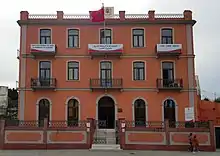 Consulate-General of Morocco in Algeciras
Consulate-General of Morocco in Algeciras Consulate-General of Morocco in Barcelona
Consulate-General of Morocco in Barcelona Consulate-General of Spain in Larache
Consulate-General of Spain in Larache
Demography
- Moroccans in Spain
- Spaniards in Morocco
- Arabic languague in Spain
- Spanish languague in Morocco
Common history
- Hispania
- Caliphate of Cordoba
- Taifa of Ceuta (in Ceuta and Tangier)
- Almoravid Empire
- Almohad Empire
- Benimerin Empire
See also
References
- Alexis Arieff. "Morocco: Current Issues". Congressional Research Service (June 30, 2011).
 This article incorporates text from this source, which is in the public domain.
This article incorporates text from this source, which is in the public domain. - García de Frutos, Moira (2011). "Perejil, un conflicto simbólico por la información". Revista Aequitas. 1 (1): 83–97. ISSN 2174-9493.
- "Las Fuerzas Armadas españolas retoman la isla de Perejil". El País. 17 July 2002.
- Cembrero, Ignacio. "Marruecos cierra unilateral y definitivamente la aduana de Melilla". El Confidencial.
- "Podemos pide a Sánchez que garantice el referéndum del Sahara en plena crisis migratoria con Marruecos". abc (in Spanish). 2020-11-18. Retrieved 2020-12-22.
- "Apoyo a la ONU para garantizar alto el fuego en el Sáhara Occidental". www.exteriores.gob.es. Retrieved 2020-12-22.
- elDiario.es (2020-12-21). "España convoca a la embajadora de Marruecos por unas declaraciones de su primer ministro sobre Ceuta y Melilla". ElDiario.es (in Spanish). Retrieved 2020-12-22.
- AfricaNews (2020-12-22). "Moroccan Ambassador to Spain summoned over calls for territorial sovereignty talks". Africanews. Retrieved 2020-12-22.
